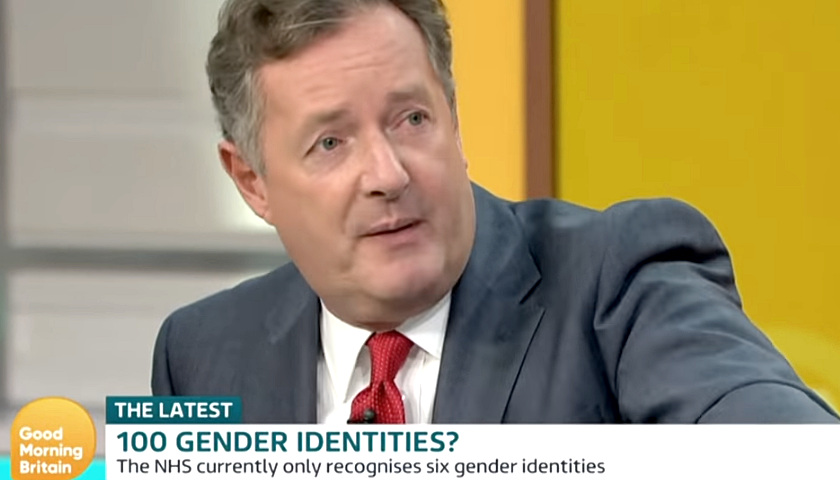by George Luke
Should Piers Morgan be fired for his view on gender?
The BBC recently endorsed an apparatus to support more than two gender identities. Piers Morgan highlighted this decision in an interview with gay journalist Benjamin Butterworth during which the former expressed frustration with the conversation, saying:
I feel insulted and offended that you’re calling me a ‘cis-man’ when I’m actually a man.
Piers is getting at an overlooked detail, namely, what is the boundary of moral offense in discussions of gender and sexuality? Where can we legitimately say that someone’s view on gender itself creates an offensive construct of self that we can reject?
In a later interview Piers joked that saying an identity is defined by recognition by a group – rather than conformity to a binary defined by biology – means he could legitimately give himself the identity of a “2-spirit penguin.”
This comment inspired great outrage and a Change.org petition to get Piers fired, countered by other petitions to keep him on the air.
Outrage aside, does Piers have a point? Has the definition of gender gone beyond the realm reality and common sense?
Quite possibly. Even John Money, whose work on David Reimer provided the foundation for modern transgender studies, would never have imagined the blossoming of his field into so many genders. To quote Piers again:
You want me to respect all those 100 genders, however ludicrous some of them are. But you have zero respect for my right to identify myself in any way I see fit.
In the same interview India/Jonathan Willoughby, a transgender guest, sided with Piers Morgan, expressing anger at those who, like Benjamin Butterworth, desire to see Morgan fired over his politically incorrect comments:
Transgender now has become something completely different. Transgender now is about floating about in the middle, no commitment, you pick and choose who you want to be. And with the greatest respect I don’t need any gay people coming in to represent me, because I’m trans. It’s not the same as being gay. And if you’re saying that, you know, this is making a mockery of gender, well what’s your views on drag? I find drag far more offensive than anything that Piers says. Drag is, no but drag is gay men dressing up as women in a flamboyant way – exaggerated mannerisms – they’re mocking gender!
The internal conflict among the LGBTQ coalition was a recent topic in Dave Chappelle’s Netflix special, “Sticks & Stones.” But India/Jonathan Willoughby is revealing a lesser known conflict, namely, the one between transgenders on how to define legitimate participation in gender identity.
There seems to be a break among those advocating for the importance of gender identity as a psychological construct. They have trouble agreeing about which components of a gendered person overlap with or diverge from biological sex characteristics.
Biological self can be mismatched with gender identity, with individuals either choosing to reckon with the experience of dysphoria by accepting it – as endorsed by feminist and self-identified transgender Camille Paglia – or by getting surgery to conform to the appearance of a biological male or female – as India/Jonathan Willoughby did.
This perspective is different from those who, like Benjamin Butterworth, advocate for the legitimacy of non-binary gender identities.
Given these views, it’s important to consider whether gender identity is defined by one’s own choice and validated by one’s own community, or if it is instead subject to the binary of biology. This also leads us to ask, “Are there moral laws which should shape how material biology interacts with internal awareness?”
– – –
George Luke is a 2019 Alcuin Intern. A graduate of Bethlehem College & Seminary and Vanderbilt University, he enjoys writing and talking about theology, philosophy, and politics. When not doing either, he’s probably with his wife or reading a book.




